You can bring a lot of personality to your yard when you attract Woodpeckers to a bird feeder. It’s fun to watch them as they scale up and down trees and feeders looking for food. Some of them, like Downy and Red-Bellied Woodpeckers, are among my favorite feeder visitors.
In my experience, Woodpeckers tend to be loyal guests. Once you bring one to your feeder, chances are good they’ll keep coming back for a while. Downy Woodpeckers have become my most regular birds at my feeding station. They visit nearly every single day!
I’ve been feeding birds from my apartment balcony since 2020 and wanted to create an article for anyone looking to draw Woodpeckers to their feeders. I’ve been lucky to regularly see Downy, Hairy and Red-Bellied Woodpeckers, along with Northern Flickers, at my feeders. I want to share what’s worked well for me.
Before diving into my specific tips for Woodpeckers, here are a handful of universal things you can do to increase your chances of bringing birds to your yard.
- Provide water (especially a heated bird bath in the winter)
- Plant native plants in your yard
- Keep your cats indoors
- Clean your bird feeders every few weeks to prevent disease from spreading
Disclaimer: Some links found on this page might be affiliate links. If you click an affiliate link and make a purchase, I might earn a commission. As an Amazon Associate I earn from qualifying purchases.
For this article, I’m leveraging a lot of my years of experience as a bird feeding hobbyist, but am also presenting information backed by sources like the Cornell Bird Lab of Ornithology, The National Audubon Society, and Wild Birds Unlimited.
With that, here are a few quick tips to increase your odds of drawing in Woodpeckers to your yard.
1. Attract Woodpeckers With Their Favorite Food – Suet
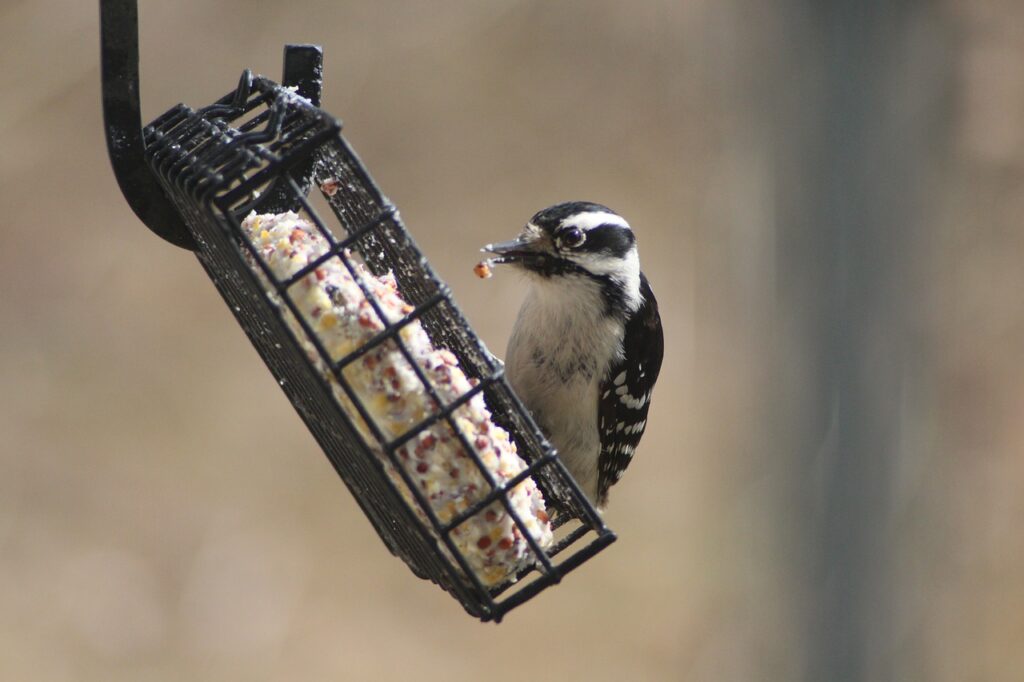
Suet (rendered fat) is the name of the game for Woodpeckers. Nearly every species that you can attract to a bird feeder will love snacking on it. Also, suet is cheap! It costs $1 to $5 for a cake of it, which usually lasts me for a couple of weeks. It also draws in other fun birds like:
- Chickadees
- Jays
- Nuthatches
- Tanagers (sometimes)
- Warblers (some species like the Yellow-Rumped Warbler)
- Wrens (sometimes)
Related: 5 Time-Tested Ways to Attract Cardinals to Your Bird Feeder
There are many varieties of suet you can buy, both in terms of flavor and shapes. In my experience, peanut-flavored suet, high-energy suet, and suet cakes with insects mixed in have yielded the best results.
You can also buy suet pellets for hopper and tray bird feeders. It’s fun to see a woodpecker snatch one of these up. Blue Jays also like them on my platform feeder.
Having trouble with squirrels? You can buy spicy suet for your feeders. Squirrels don’t like spice, but birds can’t taste it. It’s an easy solution! Spicy suet is more expensive, but my birds go nuts for this spicy insect hot pepper suet. The squirrels don’t touch it! So, you’ll end up saving money by keeping rodents away.
Related Content: Ranking the Effectiveness of Squirrel Bird Feeder Deterrents
2. Put Out Bird Seed Woodpeckers Like
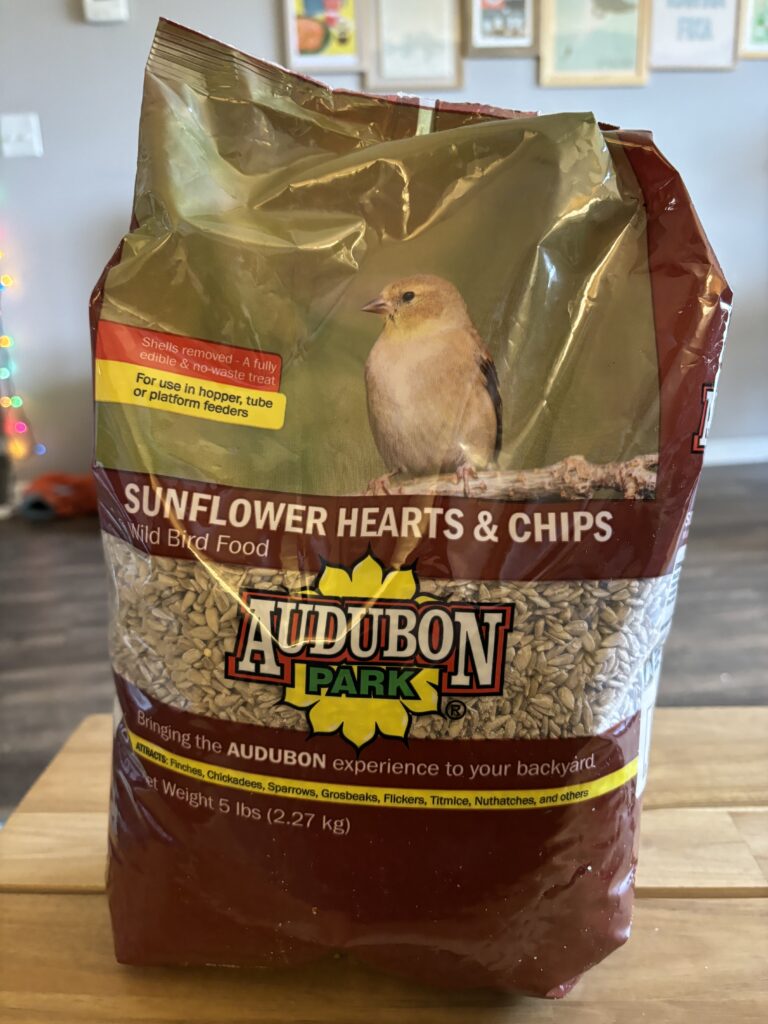
Outside of suet, many Woodpecker species also enjoy sunflower seed, mealworms, and peanut bits. I often see Downy and Hairy Woodpeckers eating hulled sunflower seed that I put into my hopper and tube bird feeders. Sunflower seed also attracts a ton of other birds like Northern Cardinals, House Finches, Nuthatches, and Chickadees.
Some species, specifically Red-Bellied Woodpeckers, might also snack on oranges and nectar in the spring and summer. It’s a nice bonus if you put out these items for Orioles and Hummingbirds.
3. Attract Woodpeckers with the Right Bird Feeder
Once you get your hands on suet, you’re going to also need a suet-specific bird feeder. The good news is that these tend to be cheap and easy to use.
Several different feeder options are perfect for Woodpeckers. My personal favorite is using a suet log feeder made from birch tree logs that I buy from my local Wild Bird Store. It’s made from an actual birch log with three holes drilled into it for suet plugs. My Downy Woodpeckers, Chickadees and Nuthatches love it. You can also buy a similar feeder on Amazon.
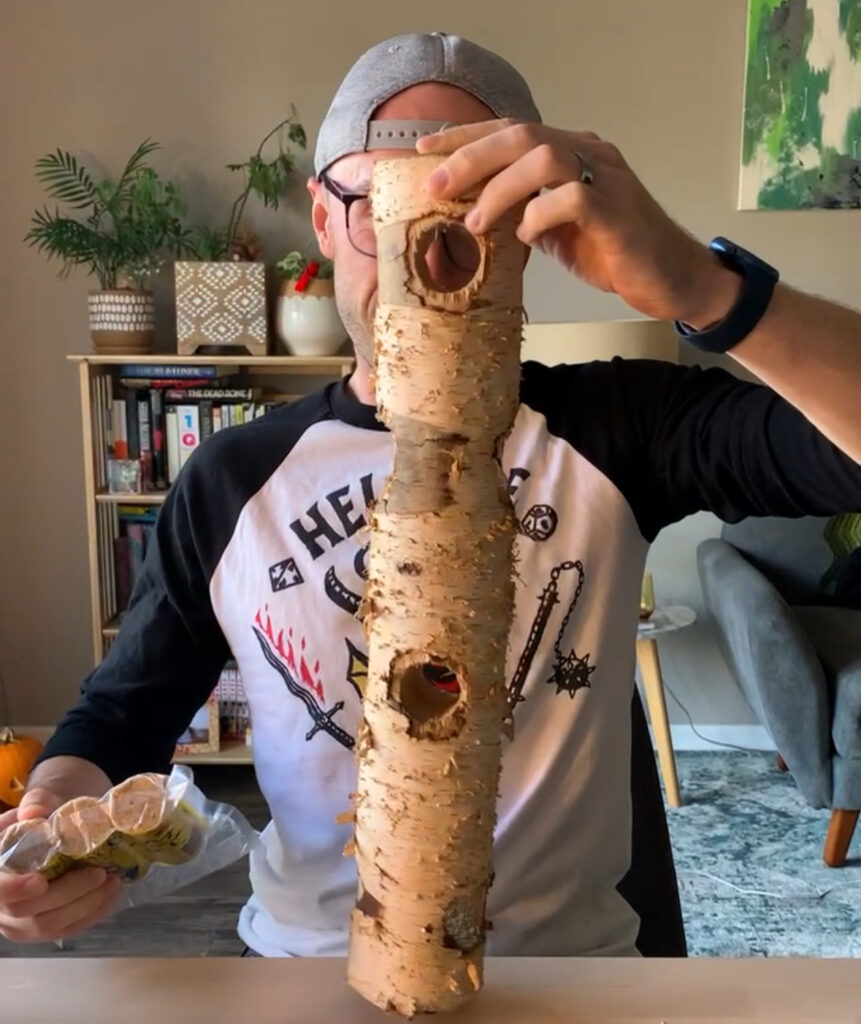
For larger woodpeckers, especially Pileated Woodpeckers, you’ll want to buy a feeder with a long base below the cage to support their tail when they land. These feeders hold a lot of suet and are sure to bring in Woodpeckers of all sizes.
Looking for a cost-effective option? Buy a dirt cheap cage feeder and slap a suet cake into it. Done!
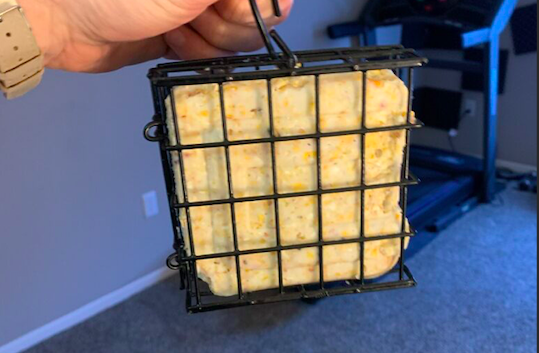
Unfortunately, suet can also draw in pesky birds like European Starlings, who gobble it down quickly. A fix for this problem is to buy an upside down suet feeder. Woodpeckers are acrobatic and can cling to it with ease. Starlings and black birds will have trouble.
4. Attract Woodpeckers by Avoiding the Use of Pesticides in Your Yard
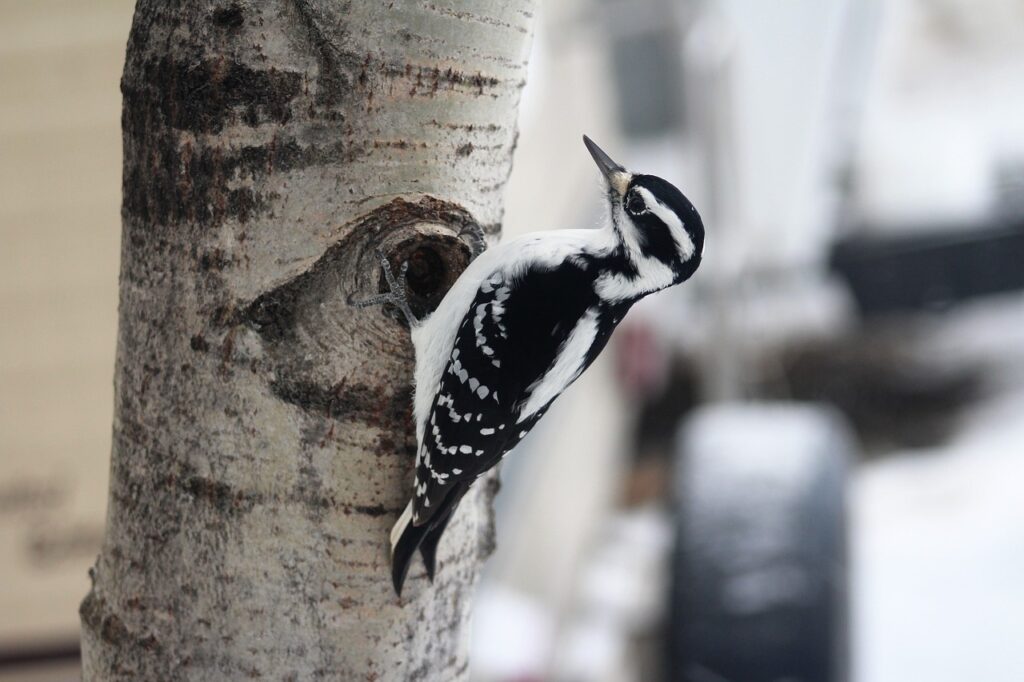
Woodpeckers love to eat insects. If you use pesticides on your yard, you’ll end up killing a natural food source that can draw them and other birds to your yard.
The Cornell Bird Lab and other sources link pesticide use to harming birds and wildlife. It’s best to cut down or eliminate your use of pesticides in your yard whenever you can.
According to the American Bird Conservatory, some alternatives to pesticides for weeds in your yard are: Hand-pulling the weeds, using a diluted mix of white vinegar, salt and dish soap, or by using a more natural weed killer.
5. Attract Woodpeckers by Having Dead Trees Nearby
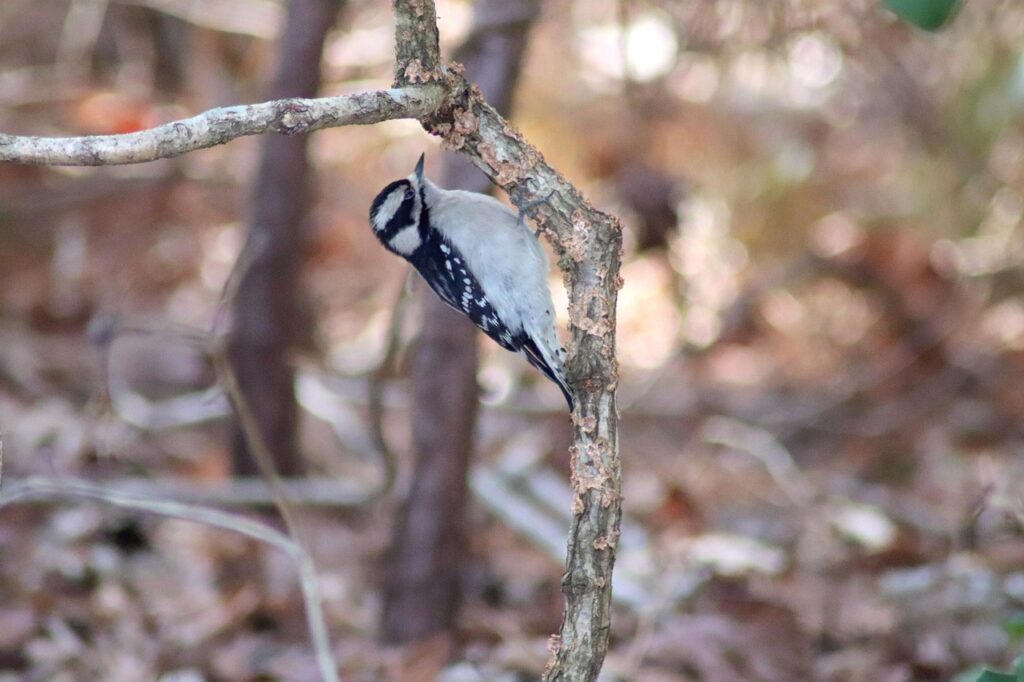
Leaving dead trees in your yard will encourage Woodpeckers to forage for insects and potentially even nest in them. Red Bellied, Downy, Hairy and Pileated Woodpeckers love inspecting dead trees.
If you don’t like the idea of leaving dead trees in your yard, you can consider leaving a few dead logs or build up a brush pile in a designated space in your yard with branches and wood scraps.
6. Provide a Woodpecker-Specific Source of Water in Your Yard
Compared to songbirds, Woodpeckers may be shy to visit a busy bird bath. So, you can consider providing Woodpeckers with a more secluded bird bath option. It’s helpful to place the bird bath in a low-traffic space in your yard, ideally next to trees and shelter nearby.
7. A Photo Guide to Common Woodpeckers at your Feeder
Here’s a listing of some of the most common Woodpeckers you can attract to a feeder.
Downy Woodpecker
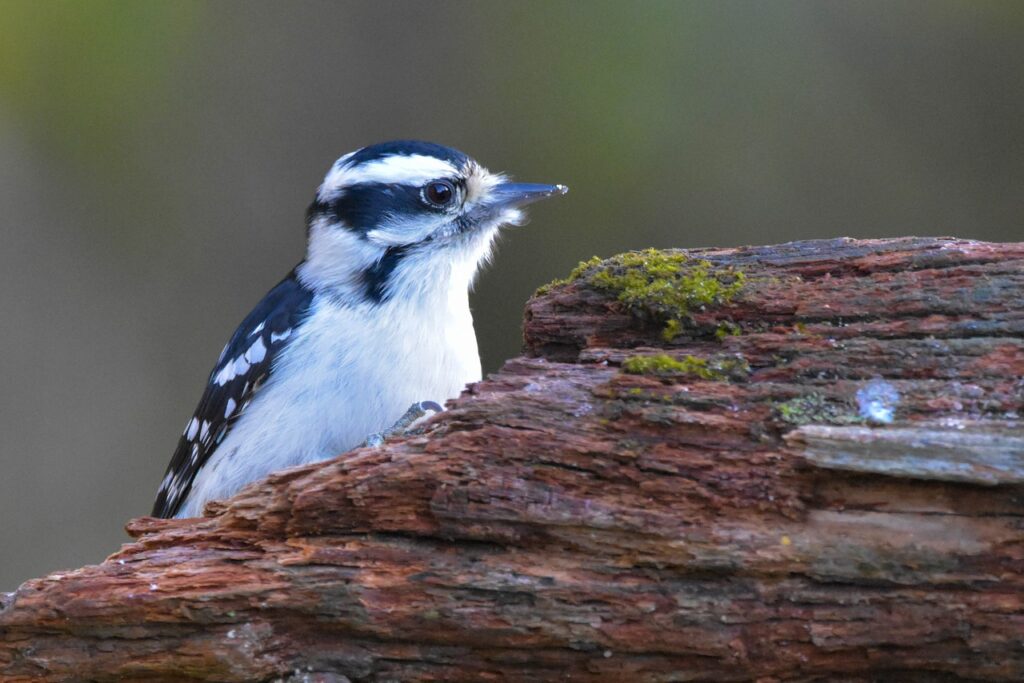
Downy Woodpeckers have a shorter bill compared to the similar-looking Hairy Woodpecker. They’re prevalent in any wooded area and suburban neighborhoods. I draw in several Downy’s to my feeders, even though I live in a suburban apartment complex. Listen for their loud “peek!” calls.
Hairy Woodpecker
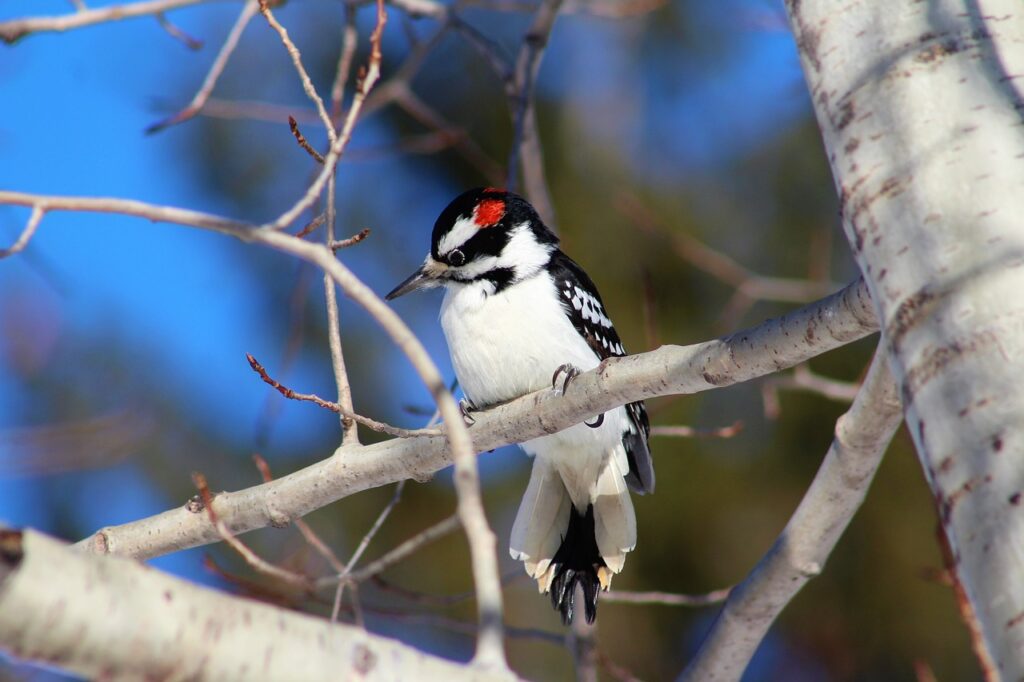
Hairy Woodpeckers are almost identical to Downy Woodpeckers in terms of their colors and feather patterns. But, they’re larger (about the same size as a Robin) and have bigger bills as a differentiator. They’re also common backyard visitors like the Downy and love suet.
Northern Flicker
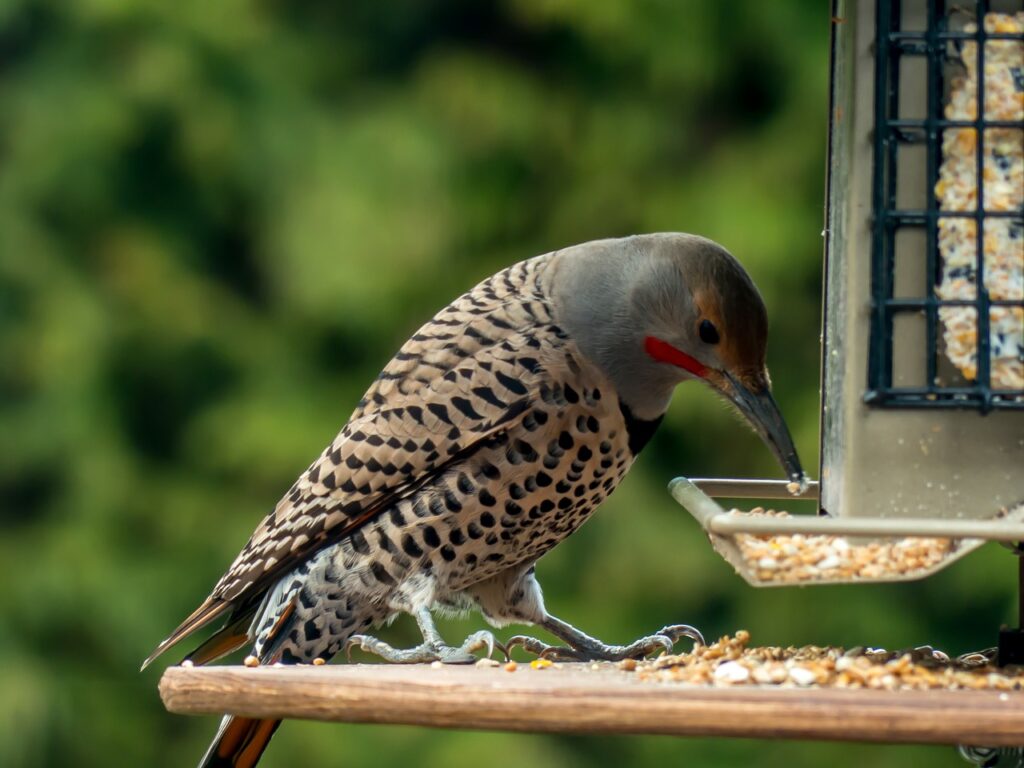
Northern Flickers are rarer at bird feeders as they prefer eating insects like ants from the ground. They will sometimes visit suet feeders. Northern Flickers are fairly common across the United States and up in Canada during the breeding season.
Pileated Woodpecker
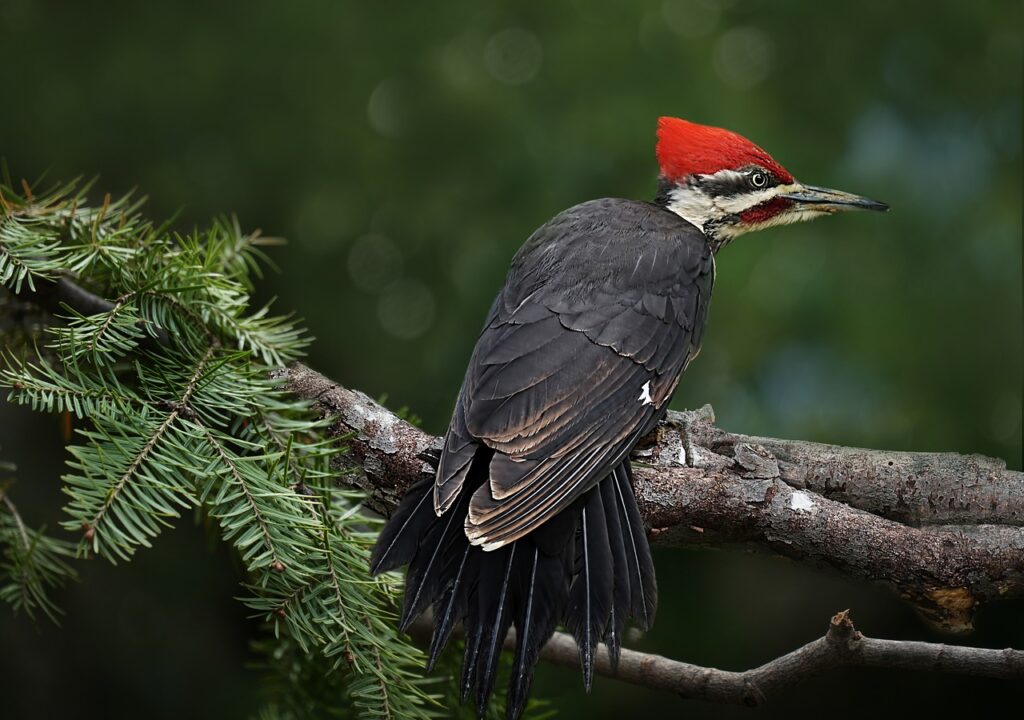
A huge woodpecker at 16-19 inches. So, basically crow-sized. Pileated Woodpeckers are a delight to see if you live in or near a forested area. I was in awe when I saw one of these while staying at a cabin in Grand Marais, Minnesota. They’re a sight to behold!
Red Bellied Woodpecker
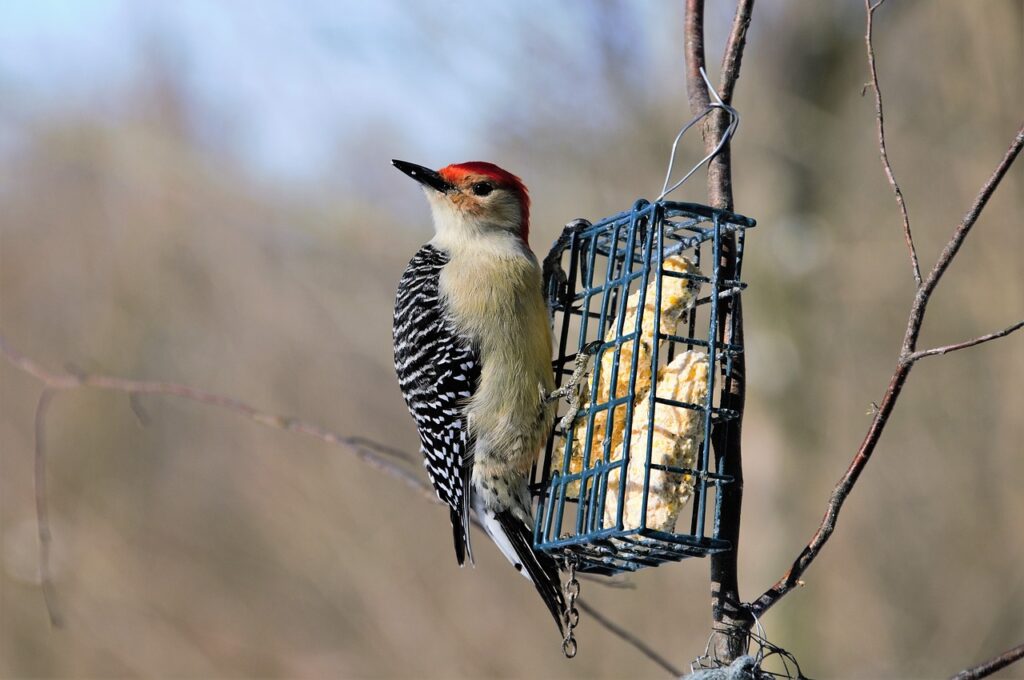
Another common feeder visitor, Red Bellied Woodpeckers are found throughout forested areas and the suburbs. Like every other bird on this list, they love suet but will also enjoy eating peanuts and sunflower seeds. I’ve heard they also enjoy snacking on hummingbird nectar and oranges if you put those out in the summer.
